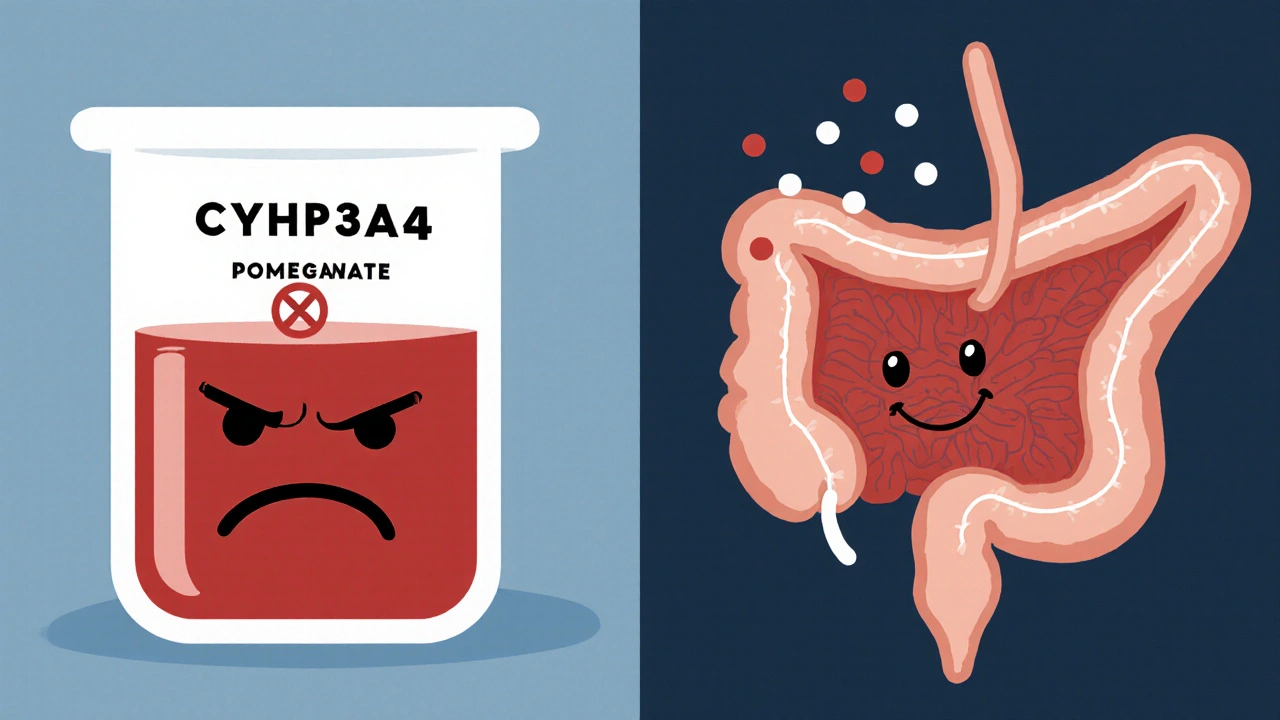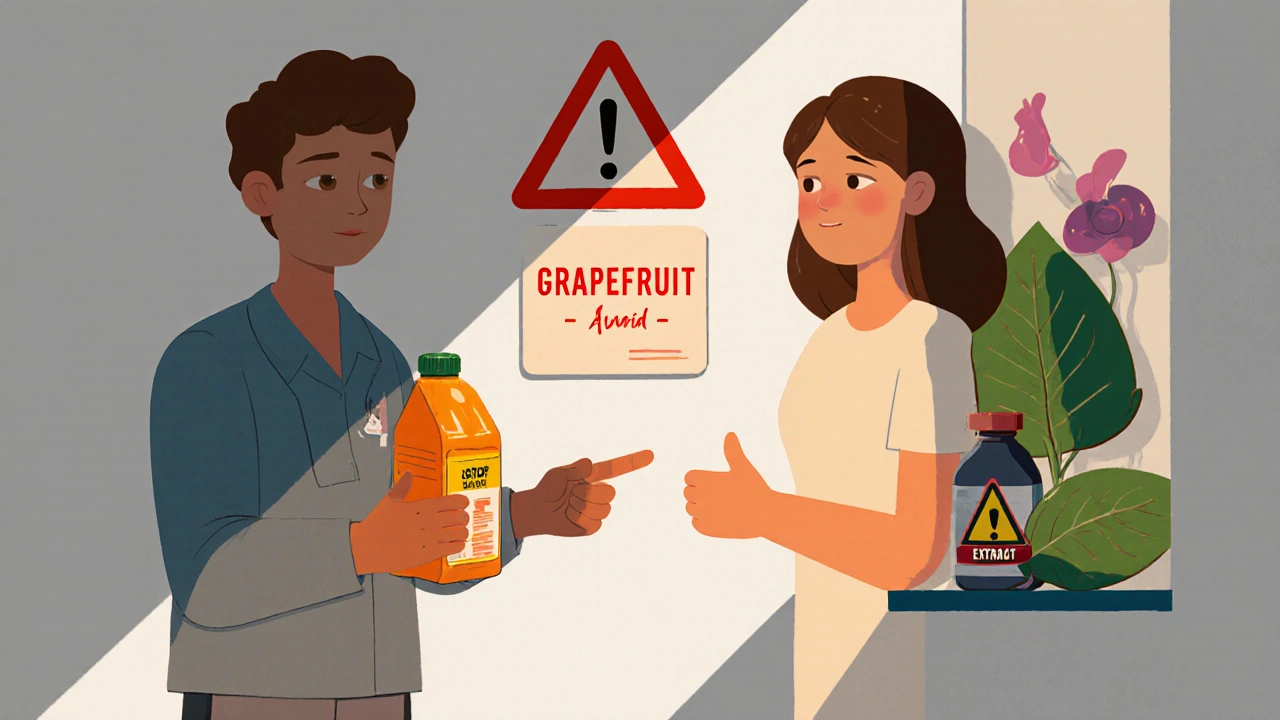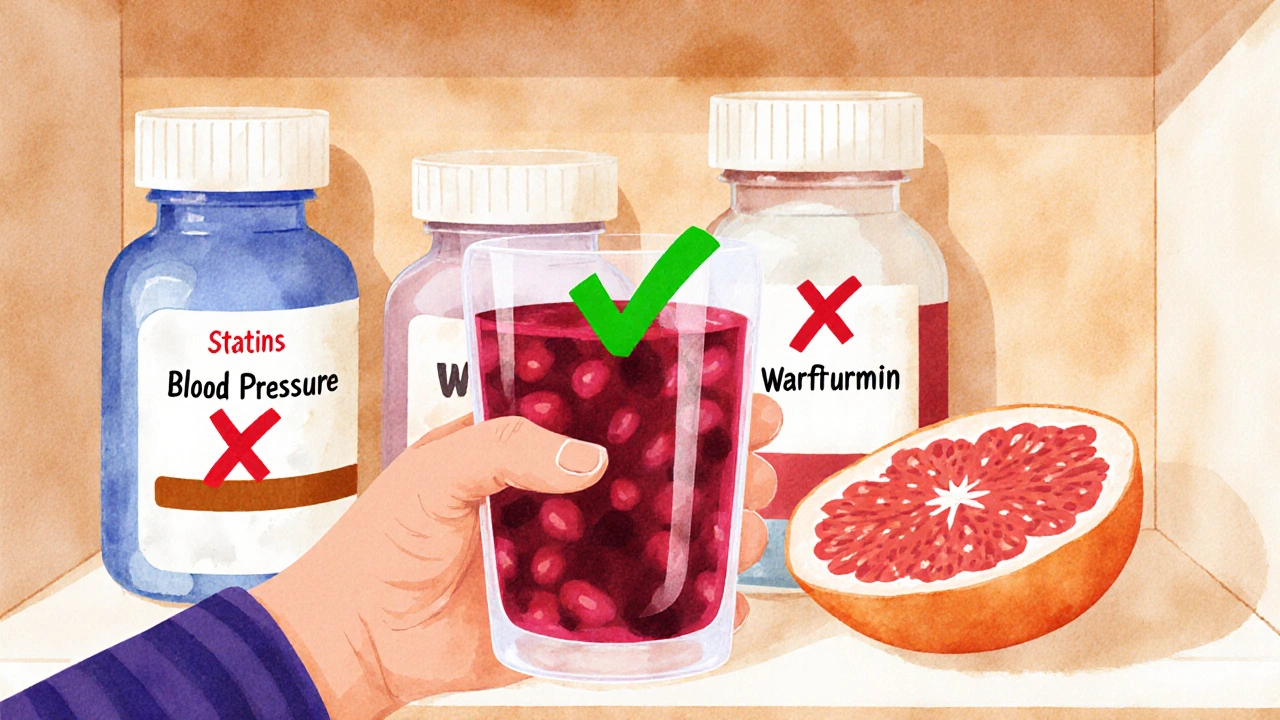Medication Interaction Checker
This tool helps you determine if pomegranate juice interacts with your current medications based on real human studies. Unlike grapefruit juice, pomegranate juice is generally safe with most common drugs.
Select a medication to see safety information
Many people drink pomegranate juice for its antioxidants and tart flavor, but if you’re on medication, you’ve probably heard warnings about it-like those you get for grapefruit juice. The truth? Pomegranate juice doesn’t act like grapefruit juice when it comes to drug interactions, even though early lab studies said it might.
Why the confusion started
Back in 2005, a lab study showed pomegranate juice could block CYP3A4, the same liver enzyme that grapefruit juice shuts down. That enzyme breaks down more than half of all prescription drugs, including statins, blood pressure meds, and anti-anxiety pills. When it’s inhibited, drug levels can spike, leading to dangerous side effects. Grapefruit juice does this reliably-and doctors have been warning patients for decades. So when pomegranate juice showed similar results in test tubes, everyone assumed the same rules applied. But here’s the problem: test tubes aren’t people. The compounds in pomegranate juice that blocked enzymes in the lab didn’t survive the journey through the human digestive system in high enough concentrations to matter. Unlike grapefruit juice, which delivers its active chemicals straight to the intestinal wall where CYP3A4 lives, pomegranate juice gets broken down, diluted, and processed before it ever reaches that spot.What human studies actually found
Between 2007 and 2013, multiple real-world trials tested pomegranate juice on people taking common medications. One study gave volunteers daily pomegranate juice while they took midazolam, a sedative metabolized by CYP3A4. The results? No change in drug levels. Another tested flurbiprofen, a painkiller handled by CYP2C9. Again, no difference in how the body processed the drug. The numbers tell the story: in both cases, the geometric mean ratios for drug exposure (AUC) and peak concentration (Cmax) were almost exactly 1.0-meaning pomegranate juice had no measurable effect. These weren’t small studies. They were controlled, peer-reviewed, and replicated across different populations. Even when researchers looked at warfarin-a blood thinner with a narrow safety window and known sensitivity to diet-pomegranate juice didn’t cause spikes in INR levels. One patient on Reddit reported drinking pomegranate juice daily for six months while on warfarin, with INR staying steady between 2.0 and 2.5. That’s not luck-it’s evidence.Grapefruit juice vs. pomegranate juice: the real difference
Grapefruit juice isn’t just a minor concern-it’s a major risk. A single glass can increase the blood levels of felodipine (a blood pressure drug) by over 350%. That’s why the FDA lists it as a known inhibitor for 85 medications. Warnings are printed on labels. Pharmacies flag it in their systems. Pomegranate juice? Not even close. The University of Washington’s Drug Interaction Database gives it a “B” rating-meaning there’s moderate evidence against any interaction. Grapefruit juice? “A” rating-strong, proven, unavoidable risk. The difference comes down to chemistry. Grapefruit contains furanocoumarins, compounds that permanently disable CYP3A4 enzymes in the gut. Pomegranate has punicalagins and ellagic acid-powerful antioxidants, yes-but they don’t bind to CYP enzymes the same way. Even when concentrated, they don’t stick around long enough to cause problems.
What about pomegranate extract supplements?
This is where things get tricky. Supplements aren’t juice. They’re concentrated extracts-sometimes made from the peel, seeds, or whole fruit-and may contain higher doses of compounds not found in the juice you buy at the store. There’s one case report from 2017 where a patient taking pomegranate extract saw their INR jump from 2.4 to 4.1. That’s a serious risk for bleeding. But here’s the catch: that patient took a supplement, not juice. And the study didn’t control for other factors like diet changes or missed doses. Still, it’s enough to make experts cautious. The National Institutes of Health is now funding research into whether these extracts affect intestinal transporters-another pathway drugs use to enter the bloodstream. Bottom line: stick to the juice. Avoid pills, powders, or concentrated extracts unless you’ve talked to your doctor.What doctors and pharmacists actually do
A 2016 survey found that 68% of physicians wrongly believed pomegranate juice needed the same warnings as grapefruit juice. That’s a big gap in knowledge. But things are changing. Today, only 12% of pharmacists routinely warn patients about pomegranate juice. Compare that to 98% who warn about grapefruit juice. The American Society for Clinical Pharmacology and Therapeutics officially stated in 2015 that pomegranate juice doesn’t require avoidance with CYP3A4 or CYP2C9 substrate drugs. That’s the current standard. Pharmacists on Reddit’s r/Pharmacy confirmed it: out of 47 comments, 42 said they never tell patients to avoid pomegranate juice. One pharmacist with 12 years of experience said, “I’ve had several cases where grapefruit juice spiked INR with warfarin. I’ve never seen one with pomegranate.”
What you should do
If you’re taking medication and drink pomegranate juice regularly:- Keep drinking it. There’s no reason to stop based on current evidence.
- Don’t switch to pomegranate extract supplements unless your doctor approves them.
- Don’t confuse juice with concentrate, powder, or capsules-they’re not the same.
- If you’re on warfarin, keep monitoring your INR. Diet changes can still affect it, but pomegranate juice isn’t the culprit.
- Always tell your doctor or pharmacist about everything you’re consuming, even if you think it’s harmless.
Why this matters beyond pomegranate juice
This isn’t just about one fruit. It’s about how we interpret science. Lab studies are important-they help us spot potential risks. But they’re not the final word. Real people don’t live in test tubes. What works in a dish doesn’t always work in a body. The pomegranate juice story is a textbook example of why we need human data before changing clinical practice. It’s also why you shouldn’t panic every time you hear “this food might interact with your meds.” Ask for the evidence. Look for human trials. And don’t let outdated myths keep you from eating healthy foods.What’s next?
Research continues. Scientists are now looking at whether pomegranate compounds affect other drug transporters like P-glycoprotein. But as of October 2024, no major health agency has changed its stance. The FDA, EMA, and WHO all treat pomegranate juice as safe alongside medications. Industry analysts predict that within the next decade, pomegranate juice will remain unrestricted-while grapefruit juice stays firmly on the warning list. That’s not going to change anytime soon.Can I drink pomegranate juice while taking blood pressure medication?
Yes. Multiple clinical studies have shown that pomegranate juice does not affect the levels of common blood pressure medications like amlodipine, lisinopril, or losartan. Unlike grapefruit juice, it doesn’t interfere with the CYP3A4 enzyme in a way that raises drug concentrations in your blood.
Does pomegranate juice interact with warfarin (Coumadin)?
Current evidence says no. Several human studies and patient reports show no significant effect on INR levels when drinking pomegranate juice. However, avoid pomegranate extract supplements-those are different and have been linked to rare cases of increased bleeding risk. Stick to the juice, and keep monitoring your INR as usual.
Is pomegranate juice safe with statins like atorvastatin?
Yes. Unlike grapefruit juice, which can dangerously raise statin levels and cause muscle damage, pomegranate juice has been tested with atorvastatin and simvastatin in clinical trials. No changes in drug concentration were found. You can safely enjoy pomegranate juice with your statin.
Why do some websites still warn about pomegranate juice?
Many websites still list it as a risk because they’re repeating outdated lab studies from 2005. Those showed potential in test tubes, but human trials since then have proven those effects don’t happen in real life. Always check if the source cites actual human studies-not just petri dish results.
Should I avoid pomegranate juice if I’m on multiple medications?
No, not because of pomegranate juice. If you’re on multiple medications, the bigger concern is grapefruit juice, alcohol, or herbal supplements like St. John’s wort. Pomegranate juice has been tested with combinations of drugs and hasn’t shown any clinically relevant interactions. Still, always tell your doctor everything you’re taking-even natural products.









Meghan Rose
November 4, 2025 AT 00:12I've been drinking pomegranate juice with my statin for years and never thought twice about it. Then I saw a blog post from 2012 warning me to stop-so I panicked and switched to apple juice for six months. Turns out I was fine all along. Why do we let outdated internet fear-mongering dictate our health choices? I'm not even mad, just tired.
Steve Phillips
November 6, 2025 AT 00:06Oh. My. GOD. Someone finally said it. The 2005 lab study? That’s like saying ‘a single drop of ink in a swimming pool proves the whole ocean is black.’ And now we’re still treating pomegranate juice like it’s liquid nuclear waste? Meanwhile, grapefruit juice is out here wrecking people’s kidneys and nobody bats an eye. The hypocrisy is breathtaking. Also-pomegranate juice tastes like liquid rubies. Stop being scared of flavor.
Rachel Puno
November 7, 2025 AT 03:18This is such a needed post. So many people are unnecessarily afraid of healthy foods because of vague, outdated warnings. If you’re on meds, just keep doing your INR checks and talk to your pharmacist. You don’t need to give up something you love because of a test tube. Keep enjoying your juice. You’ve earned it.
Clyde Verdin Jr
November 8, 2025 AT 21:51Wait… so you’re telling me I can still drink this $8 bottle of ‘antioxidant magic’ without becoming a human side effect? 😱 I thought I was gonna die from my morning smoothie. I’m literally crying right now. Also, why do I feel like I’ve been gaslit by every wellness influencer since 2014? 😭💊
Key Davis
November 9, 2025 AT 02:10It is with considerable respect for the scientific method and clinical evidence that I acknowledge the thoroughness of this exposition. The distinction between in vitro inhibition and in vivo pharmacokinetics is not merely academic-it is foundational to evidence-based practice. I commend the author for delineating the nuanced disparity between laboratory observation and clinical reality. One hopes this clarity will permeate medical education and public health messaging.
Cris Ceceris
November 9, 2025 AT 20:28It’s wild how we treat food like a drug when it’s not. We don’t worry about broccoli interfering with aspirin, but pomegranate juice? Suddenly it’s a chemical weapon. What if the real problem isn’t the juice-it’s our fear of trusting our own bodies? We’ve outsourced our health to algorithms and headlines. Maybe the real interaction is between anxiety and medicine.
Brad Seymour
November 10, 2025 AT 21:18Love this breakdown. Honestly, I’ve been telling my patients this for years and they still look at me like I’m speaking alien. One guy came in last week convinced he had to quit his juice because his cousin read it on a ‘natural health’ site. I showed him the 2013 study and he just stared at me like I’d just given him a hug. We need more of this. Keep spreading the truth.
Malia Blom
November 11, 2025 AT 20:40But what if the real danger isn’t the juice… it’s the fact that we’ve been conditioned to believe every natural thing is either a miracle or a poison? We don’t need more lists of ‘safe’ and ‘unsafe’ foods-we need to stop treating nutrition like a minefield. Pomegranate juice isn’t the villain. The system that turns healthy habits into fear-based compliance is.